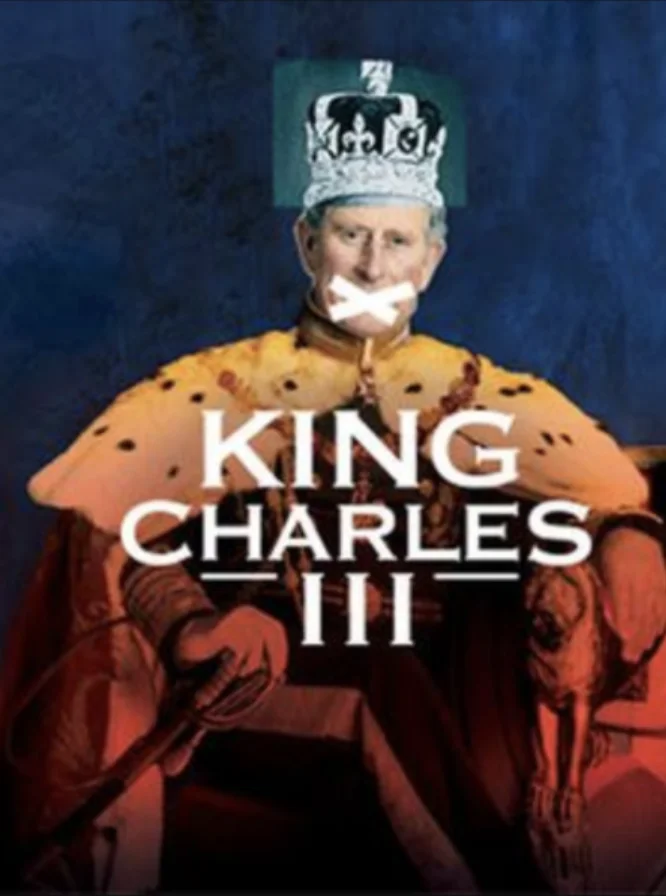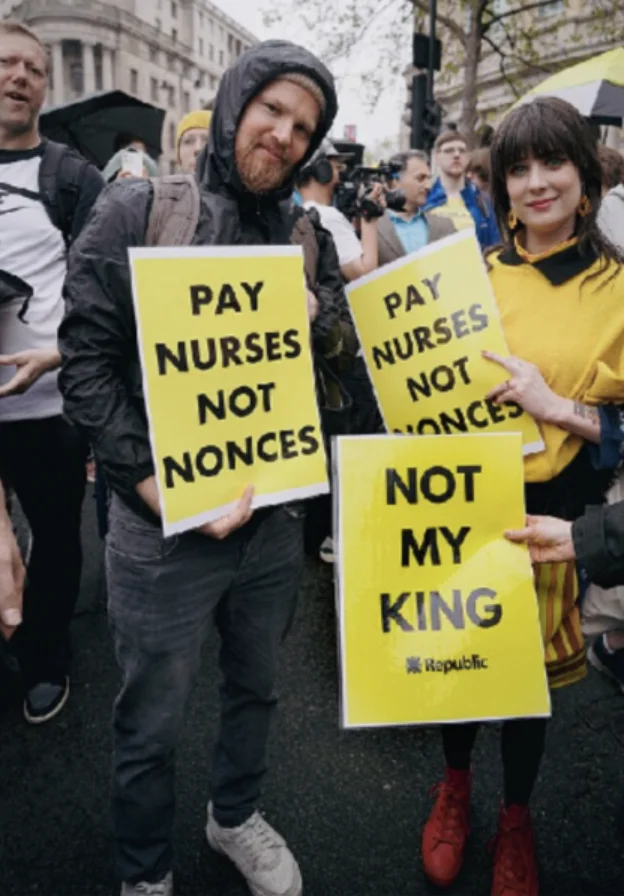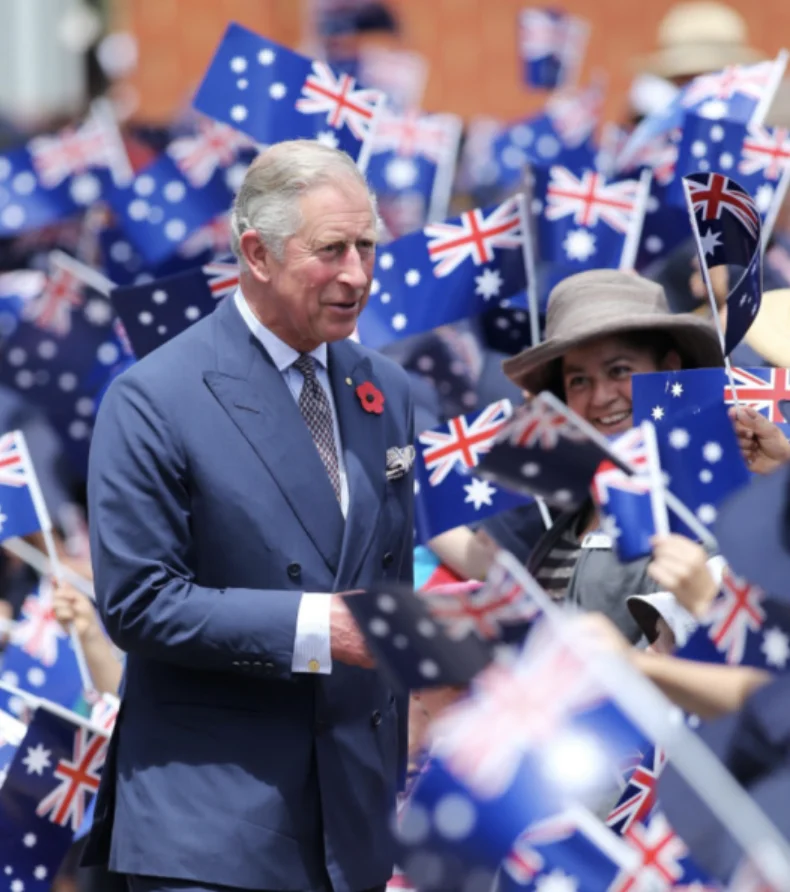The Divine Right of Kings?

In 1793 the blade on a newfangled killing machine was hard at work. When it sliced through the neck of King Louis XVI and his head tumbled into the guillotine’s basket, the Divine Right of Kings came to an end in France. More than a thousand years of continuous French monarchy was over.
The chopping off of heads appears to many to be a rather dramatic way to dispose of a royal family. But it didn’t end there, because the French media remains besotted with what the British Royals are up to. And the coverage was at a fever pitch when Charles III was crowned,
“This royal throne of kings, this sceptr’d isle, This earth of majesty,…”
Meaning, the so-called United Kingdom, is just 21 miles across la Manche from France. And it’s where the medieval concept of the Divine Right of Kings is alive and well and thriving.
King Charles Coronation

There was a frenzied media focus on the event in France where almost 9 million people watched King Charles’s Coronation live on French TV. Le Monde followed the ceremony online in English, and there were innumerable souvenir front pages and lengthy television specials across different channels.
French President, Emmanuel Macron, who claims to be “close to Charles,” attended the service at Westminster Abbey. When congratulating the King and Queen, he said they were “friends to France,” emphasising how things have changed since former Prime Minister, Liz Truss, said “the jury’s out” on whether the President is a “friend or foe” of Britain.
Fortunately, another diplomatic spat was narrowly avoided when Charles approved a special vegetarian “quiche” to mark his coronation. France’s historic ‘brotherhood of the Quiche Lorraine’ didn’t like it. Not at all. They claim it’s been mislabelled. Their president had a curt response:
“Quel scandale! I think I would call it a savoury tart.”
In France, connoisseurs say there is only one kind of quiche and that’s Quiche Lorraine.
Unfortunately for royalists on both sides of the Channel, not everyone was supportive of Charles’s big day.
Perspectives from France and elsewhere
French opposition leader, Jean-Luc Mélenchon, commented:
“In front of a people who have been so humiliated by neoliberal politics, this theatrics of a man covered in fancy dress with jewels and precious stones has something nauseating about it.”
And at a rally in Marseille, he added that the “syrupy” French TV coverage of the British coronation was regrettable, “when so many people live in misery.” And then, rather extremely, that it was “a reminder to us why we are so deeply Republican.” And his Parthian shot, “Kings are monsters who accept such a display in front of so much suffering.”
He has a point.
Most experts agree that the Coronation cost between €57 million and €113 million. Although weddings are paid for by the Royal Family, the Coronation is a state function, and taxpayers must pick up the tab. But, obviously, in a magnanimous frame of mind, the new King was determined to have a “less expensive” coronation as the UK wrestles with out-of-control inflation, soaring food prices, and an overall cost of living crisis.
The French paper Le Journal du Dimanche described the Coronation as “unique in Europe” but said the royal family’s wealth was becoming a “taboo” topic in the UK, with the fact that the British taxpayer picked up the bill for the sumptuous display “a bit painful” for many people.
The UK Treasury handed out this year’s (taxpayer-funded) sovereign grant payout of 86 million pounds to cover the cost of official royal duties, like visits, staff salaries, and housekeeping. However, it does not cover security costs, which are also paid for by the public — who don’t know what this amount is, because it’s a state secret.
But Le Journal is right. When the 162 million quid cost of the late Queen Elizabeth’s funeral is added to the taxpayer’s bill, it begins to make the romantic idea of a predetermined and unelected monarch seem a tad expensive.
Divine Right of Kings?
In case there’s any doubt, here’s a summary of what Wikipedia has to say about the Divine Right of Kings.
“The monarch is, before birth, pre-ordained to inherit the crown, chosen by God and in the image of God. Significantly, the doctrine asserts that a monarch is not accountable to any earthly authority (such as a parliament) because their right to rule is derived from divine authority.”
Despite this, a recent poll showed that 62% of Britons favour continuing with the Monarchy. Apparently, they still believe the Royal Family is good value for money.
Finally, and against my own better judgement, (because editors usually advise against it), I’m risking ending with a personal observation.
Believing in the Divine Right of Kings in the twenty-first century is tantamount to believing that prayer cures cancer, the earth is flat, and excessive masturbation leads to blindness.
What are your views of Royalty and The Divine Right of Kings? Please share your views in the comments section below.
Your subscription (free or paid) will be gratefully received, and will help me continue to build ‘le Bulletin’ – the weekly newsletter of MyFrenchLife.org Magazine to be even more rich- Merci Mille Fois
NOTE: the author is Australian, hence the reference to Australia. Image credits
All in the public domain:
– Christening Charles III, December 1948
– Poster for play by MikeBartlett
– Australian flags website
– Not my king








